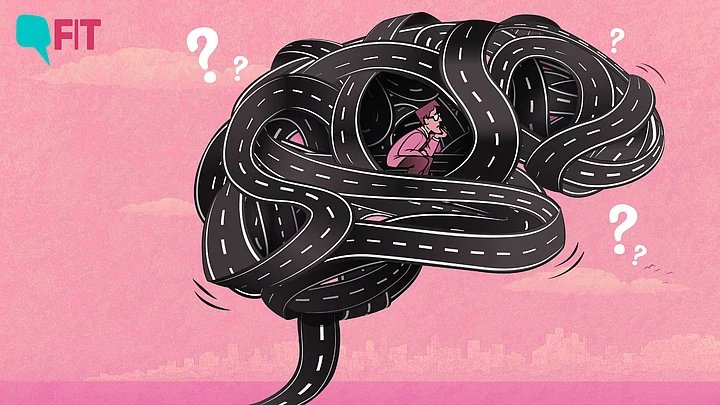Memory loss. Inability to focus. Weakened sense of direction. Increased struggle to do cognitive functions.
When someone says they are struggling with these symptoms, what's the first thing that comes to your mind? Effects of old age, right? Or possibly dementia?
These could also be symptoms of pseudodementia – a psychiatric condition that is often mistaken to be a neurological disorder.
Delhi hospitals get around 50 cases of pseudodementia per month, media reports revealed earlier this month. These cases, doctors said, were being diagnosed in most people younger than 50 years of age.
But what even is pseudodementia? Why are young people suffering from it?
FIT tells you everything you need to know about pseudodementia.
What is pseudodementia?
Pseudodementia is a clinical term that describes symptoms that resemble dementia but are caused by other conditions – such as depression.
According to a 2022 study published in the British Medical Journal, pseudodementia is characterised by a “cognitive impairment that mimics dementia but which does not have its origin in neurological degeneration, deriving instead from functional psychiatric conditions.”
What are the symptoms of pseudodementia?
According to Dr Sudhir Kumar, a neurologist at Hyderabad’s Apollo Hospital, the symptoms of pseudodementia are sometimes very similar to those of dementia. These can include:
Loss of immediate memory
Loss of sense of direction
Difficulty focusing or concentrating on things
Other symptoms might include the person’s speech and cognitive abilities being affected too.
What are the causes of pseudodementia?
Dr Fabian Almeida, Consultant Psychiatrist, Fortis Hospital, Kalyan, tells FIT that often undiagnosed and untreated mental health disorders can lead to cognitive issues and pseudodementia.
“Usually depression manifests as pseudodementia when it goes undiagnosed or the person does not acknowledge that they’re struggling with something mentally. These people usually come to doctors with a focus on memory loss. When it’s biological depression with no trigger from self or society, the depression often remains unrecognised and untreated, because people think if I’m happy in life, how could I be depressed, not realising that neurochemicals could be at play here.”Dr Fabian Almeida
But certain triggers like stress and work-life imbalance could also contribute to depression and then pseudodementia.
Dr Almeida says in cases like this:
“The patient experiences a lack of registration of things in the brain. When the brain doesn’t register, it doesn’t remember.”
Owing to stressors, people who have a history of mental health issues or those who have substance abuse disorders are more prone to pseudodementia.
"Depressive states adversely affect cognitive functions, especially in old-age or geriatric depression."2014 study published in Annals of Indian Academy of Neurology
How do medical professionals differentiate between dementia and pseudodementia?
While the surface-level symptoms may seem deceptive, Dr Kumar says that just taking the patient’s case history can itself unravel the differences.
For instance, when someone has dementia, the memory loss is gradual and is the first time. The patient might develop psychotic disorders over time, but these won’t be present at the onset of the disease.
On the other hand, with pseudodementia, the first onset of symptoms is that of the psychotic disorder or depression. Slowly over time, this turns into memory loss.
There are other things too. In pseudodementia patients:
There are clear indicators that of depression – negative thoughts, unwillingness to socialise, not eating well, not sleeping well, etc
Patients have an awareness that they’re going through memory loss are forgetting things
Condition could become psychotic if it goes undiagnosed for long
On the other hand, in dementia patients:
Patients do not have any awareness of their condition.
Patients usually do not have psychiatric or mood disorders.
Are there any clinical methods to differentiate between the two?
Clinically, it's just a matter of a few tests to diagnose pseudodementia because it’s not a progressive disease and does not lead to the brain’s degeneration.
Dr Almeida says that there are certain neuro-biological imbalances that happen when someone has dementia. An MRI of a dementia patient will show abnormal levels of amyloid plaques and tau tangles, along with an atrophy (or shrinking) of the brain.
If the patient’s case history is not revealing, an MRI can easily differentiate between dementia and pseudodementia.
Is there any treatment or preventive measures?
When patients with pseudodementia are diagnosed with depression or any other psychiatric condition, they are put on medication for that.
“When we give them antidepressants, the depression begins to settle down and we see improved memory as well.”Dr Fabian Almeida
What can also help are:
Counselling sessions
Cognitive behavioural therapy
Mindfulness exercises
(At The Quint, we question everything. Play an active role in shaping our journalism by becoming a member today.)
